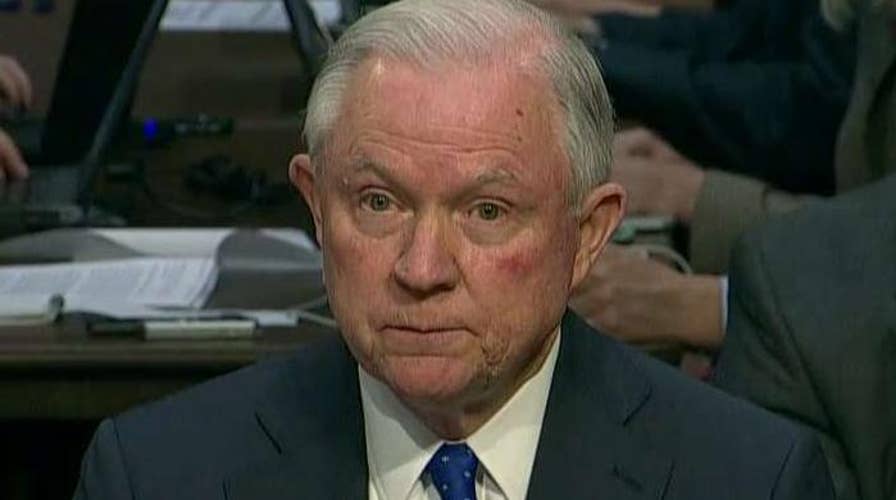Sessions questioned about his role in the Comey firing
Attorney general probed by Sen. Feinstein on President Trump's decision over the Clinton email investigation.
Attorney General Jeff Sessions on Wednesday defended President Trump’s decision to fire FBI Director James Comey but declined to answer questions about his talks with the president on the matter.
“You cannot underestimate the error made by Comey in the handling of the Clinton case,” Sessions testified before the Senate Judiciary Committee.
Sessions and Deputy Attorney General Rod Rosenstein each submitted letters in May to Trump recommending Comey’s firing.
While Sessions in his letter called for a “fresh start,” Rosenstein in large part argued Comey usurped then-Attorney General Loretta Lynch’s authority by announcing findings on his own in the Hillary Clinton email case.
Sessions said Wednesday that investigators should “never” announce such a decision ahead of the Justice Department.
However, Sessions declined to discuss the conversations with Trump about the firing. Lawmakers want to know more about the backstory, in part because Trump has publicly suggested he was prepared to fire Comey regardless of what Sessions or Rosenstein said.
“Such communications are within the core of executive privilege,” Sessions said.
Sessions, the country’s top law enforcement officer, faced a battery of sharp questions Wednesday during his testimony before the GOP-controlled Senate committee, including on whether he colluded with Russians during the 2016 presidential campaign.
“No,” Sessions said emphatically to Louisiana Republican Sen. John Kennedy in response to that question.
Sessions also said he has not been interviewed by Special Counsel Robert Mueller in his Justice Department investigation into possible Russian collusion by Trump associates.
Sessions, an early and ardent Trump campaign supporter, runs the Justice Department. But he recused himself from the investigation to end accusations of conflict of interest.
The move, which resulted in Mueller being appointed to lead the probe, infuriated Trump.
Mueller has already met with former Trump Chief of Staff Reince Priebus and former White House Press Secretary Sean Spicer. And federal agents this summer raided the house of former Trump Campaign Manager Paul Manafort, apparently looking for documents related to the Russian case.
On a question about possible Russia collusion, Sessions, as he did during his Senate confirmation hearings, said he never worked with Russian officials to influence the outcome of the White House race. He also again acknowledged having spoken with a Russian ambassador at the Republican National Convention in summer 2016 but argued he’s met numerous foreign ambassadors in recent years.
Committee Chairman Chuck Grassley, R-Iowa, began the hearing with a list concerns and questions for Sessions -- including ones on the nationwide increases in violent crime and opioid use.
“Violent crime is rising,” Sessions told the committee: “The homicide rate increased 20 percent in two years. … We are setting about to do something about it.”
Sessions, who as senator was a judiciary committee member, called the opioid problem “the deadliest drug epidemic this country has ever seen.”
He said his department will start looking at “stricter accountability” on the manufacturing and distribution of opioid drugs.





